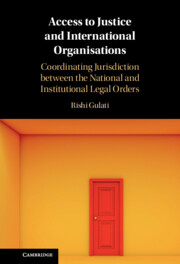 Access to Justice and International Organisations
Access to Justice and International Organisations Published online by Cambridge University Press: 10 March 2022
This chapter explains the basis of the access to justice obligations placed on international organisations (IOs) under international law. One foundational issue is whether or not IOs are capable of being placed under international obligations in general. The answer to this question, as this chapter will show, is most certainly in the affirmative. IOs are international legal persons or ‘subjects’ of international law that possess their own legal personality. This means that international law can bind IOs directly and impose obligations that ought to be implemented by the IO. After showing how international law can directly place IOs under international obligations in general, the focus shifts to whether IOs can be placed under access to justice obligations in particular. The chapter discusses what is meant by access to justice as a value, and how that value has translated into legal rights in the form of the right to a fair trial. The discussion then clarifies how IOs specifically are put under access to justice obligations, including demonstrating the rationale behind doing so. It is argued that IOs are required to provide justice consistently with fair trial guarantees to private persons whenever IO actions adversely impact them.
To save this book to your Kindle, first ensure no-reply@cambridge.org is added to your Approved Personal Document E-mail List under your Personal Document Settings on the Manage Your Content and Devices page of your Amazon account. Then enter the ‘name’ part of your Kindle email address below. Find out more about saving to your Kindle.
Note you can select to save to either the @free.kindle.com or @kindle.com variations. ‘@free.kindle.com’ emails are free but can only be saved to your device when it is connected to wi-fi. ‘@kindle.com’ emails can be delivered even when you are not connected to wi-fi, but note that service fees apply.
Find out more about the Kindle Personal Document Service.
To save content items to your account, please confirm that you agree to abide by our usage policies. If this is the first time you use this feature, you will be asked to authorise Cambridge Core to connect with your account. Find out more about saving content to Dropbox.
To save content items to your account, please confirm that you agree to abide by our usage policies. If this is the first time you use this feature, you will be asked to authorise Cambridge Core to connect with your account. Find out more about saving content to Google Drive.